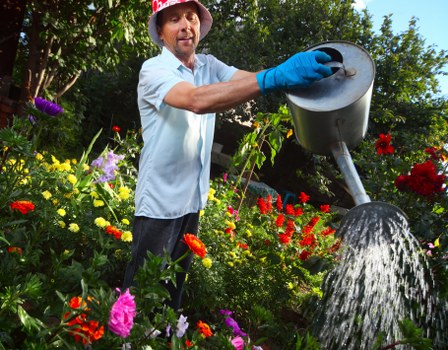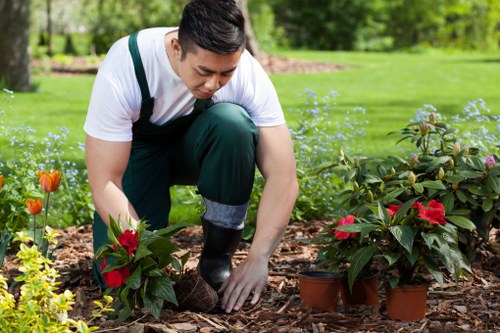Comprehensive Garden Maintenance in Dartmouth Park

Maintaining a beautiful garden in Dartmouth Park requires dedication, knowledge, and the right tools. Whether you're a seasoned gardener or a beginner, understanding the fundamentals of garden maintenance can help your outdoor space thrive all year round.
In this article, we will explore various aspects of garden maintenance specific to the Dartmouth Park area. From seasonal tasks to selecting the right plants, our guide is designed to help you create and sustain a vibrant garden.
Let’s dive into the essential tips and strategies for effective garden maintenance in Dartmouth Park.
Understanding the Climate of Dartmouth Park

Dartmouth Park enjoys a temperate climate, which is ideal for a wide variety of plants. The area experiences mild winters and warm summers, allowing for long growing seasons and diverse plant options.
Understanding the local climate is crucial for selecting plants that will thrive in your garden. Pay attention to factors such as average rainfall, temperature ranges, and sunlight exposure when planning your garden layout.
By choosing plants suited to Dartmouth Park's climate, you can reduce maintenance efforts and ensure a flourishing garden.
Seasonal Garden Maintenance Tasks

Each season brings its own set of gardening challenges and opportunities. Proper seasonal maintenance can keep your garden healthy and attractive throughout the year.
Spring: This is the time to prepare your garden for growth. Clear out any debris, plant new seeds, and start pruning trees and shrubs.
Summer: Focus on watering, weeding, and pest control. Regularly check your plants and provide necessary support structures.
Fall and Winter Maintenance
As the seasons transition, it's important to adjust your maintenance routine accordingly.
Fall: Rake fallen leaves, fertilize the soil, and plant bulbs for spring flowering.
Winter: Protect your plants from frost, clean garden tools, and plan for the next planting season.

By adhering to these seasonal tasks, you can ensure that your garden remains healthy and vibrant no matter the time of year.
Choosing the Right Plants for Dartmouth Park Gardens

Selecting plants that are well-suited to the local environment is key to successful garden maintenance. Consider native plants, which are adapted to the Dartmouth Park climate and require less maintenance.
Some popular choices include lavender, hydrangeas, and roses. These plants not only add beauty to your garden but also attract beneficial pollinators like bees and butterflies.
Incorporating a mix of perennials and annuals can provide year-round interest and continuous blooms throughout the growing season.
Essential Garden Maintenance Tools
Having the right tools is essential for effective garden maintenance. Invest in high-quality tools that will last and make your gardening tasks easier.
Some must-have tools include:
- Pruning Shears: For trimming and shaping plants.
- Garden Fork: Useful for turning soil and aerating the garden bed.
- Watering Can or Hose: Ensure your plants receive adequate water.
- Weeder: Helps in removing unwanted weeds quickly.
Proper maintenance and storage of your tools will extend their lifespan and ensure they are ready for use when needed.
Pest and Disease Management
Garden pests and diseases can cause significant damage if not managed promptly. Regular monitoring and proactive measures can help keep your garden healthy.
Implement integrated pest management (IPM) strategies, which include:
- Encouraging beneficial insects like ladybugs.
- Using organic pesticides when necessary.
- Removing infected plants to prevent the spread of disease.
Maintaining plant health through proper watering and fertilization also strengthens plants against pests and diseases.
Soil Health and Fertilization
Healthy soil is the foundation of a thriving garden. Regularly testing your soil can help you understand its composition and identify any deficiencies.
Amending your soil with organic matter such as compost or manure improves soil structure, fertility, and water retention.
Fertilizing your garden appropriately ensures that your plants receive the necessary nutrients to grow strong and resist diseases.
Pruning and Trimming Techniques
Proper pruning and trimming are essential for maintaining plant health and aesthetics. Regular pruning encourages new growth and prevents plants from becoming overgrown.
Different plants require different pruning techniques. For instance, roses benefit from shaping and deadheading, while fruit trees require thinning to promote air circulation.
Always use sharp, clean tools to make precise cuts, and avoid over-pruning, which can stress the plant.
Mulching for Garden Health
Mulching is a beneficial practice that helps retain soil moisture, suppress weeds, and regulate soil temperature. Apply a layer of organic mulch around your plants to enhance garden health.
Popular mulch options include bark, straw, and compost. Each type provides different benefits, so choose one that best suits your garden’s needs.
Mulching also adds a finished look to your garden beds, making your garden look well-maintained and tidy.
Watering Strategies for Optimal Growth
Proper watering is crucial for plant health. Overwatering can lead to root rot, while underwatering can stress plants and reduce growth.
Adopt efficient watering methods such as drip irrigation or soaker hoses to deliver water directly to the root zone, minimizing waste and ensuring plants receive adequate moisture.
Watering early in the morning reduces evaporation and allows plants to absorb moisture before the heat of the day.
Creating a Sustainable Garden
Sustainability in gardening involves practices that protect the environment while maintaining a productive garden. Incorporate sustainable techniques to reduce your garden’s ecological footprint.
Some sustainable practices include:
- Using organic fertilizers and pest control methods.
- Composting garden waste to enrich the soil.
- Planting native species that require less water and maintenance.
- Implementing rainwater harvesting systems.
By adopting these methods, you contribute to a healthier environment and a more resilient garden.
Local Garden Maintenance Services
For those who prefer professional assistance, numerous garden maintenance services operate in Dartmouth Park. These professionals offer a range of services, from regular upkeep to specialized care for specific plants.
Hiring a local expert ensures that your garden receives personalized attention and care tailored to the unique conditions of Dartmouth Park.
Professional gardeners can also provide valuable advice on plant selection, soil health, and sustainable practices, helping you achieve the garden of your dreams with less effort.
Closely Located Areas to Dartmouth Park
Dartmouth Park is surrounded by several charming neighborhoods, each offering unique features and resources for garden enthusiasts. Here are some of the closest areas:
- West Hampstead: Known for its community gardens and vibrant plant nurseries.
- Tremorfa Park: Offers spacious green areas perfect for larger gardens.
- Willesden Green: Provides access to multiple gardening clubs and workshops.
- Brondesbury: Features a mix of traditional and modern garden styles.
- Kilburn: Home to several local markets where you can find unique plants and gardening supplies.
- Hampstead: Offers extensive botanical gardens and greenhouses.
- Maida Vale: Known for its elegant terraced gardens and landscaping services.
- Queen's Park: Features community-driven garden projects and eco-friendly initiatives.
- Belsize Park: Provides access to exclusive gardening clubs and expert advice.
- Primrose Hill: Offers stunning views and well-maintained public gardens.
Each of these areas enhances the gardening experience in Dartmouth Park, providing resources, community support, and inspiration for garden maintenance enthusiasts.
Eco-Friendly Garden Practices
Adopting eco-friendly practices not only benefits your garden but also the broader environment. Here are some sustainable methods you can implement:
- Rainwater Harvesting: Collect rainwater to use for watering your plants, reducing your reliance on tap water.
- Composting: Turn kitchen scraps and garden waste into nutrient-rich compost for your soil.
- Organic Pest Control: Use natural predators and organic solutions to manage pests without harming the ecosystem.
- Solar Lighting: Illuminate your garden with solar-powered lights to save energy.
These practices contribute to a healthier garden and promote environmental sustainability.
Innovative Garden Design Ideas
Creative garden designs can transform your outdoor space into a personal sanctuary. Here are some innovative ideas to inspire you:
- Vertical Gardens: Maximize space by growing plants vertically on walls or trellises.
- Container Gardening: Use pots and containers to create flexible and mobile garden displays.
- Wildflower Meadows: Plant a mix of wildflowers to attract pollinators and create a natural, flowing landscape.
- Water Features: Incorporate ponds, fountains, or streams to add tranquility and attract wildlife.
Experimenting with these design elements can add beauty and functionality to your garden.
Maintaining Garden Paths and Structures
Paths, fences, and other garden structures play a vital role in the overall aesthetics and functionality of your garden. Regular maintenance ensures these elements remain in good condition.
Keep paths clear of debris and weeds to provide safe and attractive walkways. Inspect fences and trellises for damage and make necessary repairs to maintain their integrity.
Properly maintained structures enhance the beauty of your garden and provide essential support for your plants.
Lighting and Outdoor Decor
Outdoor lighting and decor add charm and functionality to your garden. Strategically placed lights can highlight key features and provide safety during evening hours.
Consider using solar-powered lights for an eco-friendly option. Additionally, incorporate decorative elements such as garden statues, benches, and bird feeders to create a welcoming and visually appealing space.
Thoughtful decor enhances the ambiance of your garden, making it a perfect place for relaxation and enjoyment.
Practical Tips for Garden Maintenance
Here are some practical tips to keep your garden in top shape:
- Regularly inspect plants for signs of pests and diseases.
- Water deeply but infrequently to encourage strong root growth.
- Use mulch to retain moisture and suppress weeds.
- Rotate crops annually to prevent soil depletion.
- Prune plants to maintain shape and promote healthy growth.
- Keep your garden tools clean and in good condition.
Implementing these tips can simplify your garden maintenance routine and ensure long-term success.
Community and Garden Resources in Dartmouth Park
Being part of a gardening community can provide support, inspiration, and resources. Dartmouth Park offers various avenues to connect with fellow gardeners.
Participate in local gardening clubs, attend workshops, and visit community gardens to exchange ideas and gain new skills.
Access to shared resources and collective knowledge can enhance your gardening experience and help you overcome challenges more effectively.
Conclusion
Maintaining a garden in Dartmouth Park is a rewarding endeavor that combines creativity, effort, and knowledge. By understanding the local climate, selecting appropriate plants, and adopting effective maintenance practices, you can create a thriving and beautiful garden.
Remember to embrace sustainable practices, utilize available resources, and connect with the gardening community to support your gardening journey.
With dedication and care, your Dartmouth Park garden can become a stunning oasis that brings joy and tranquility to your life.
Frequently Asked Questions
- What are the best plants for Dartmouth Park gardens?
Native plants like lavender, hydrangeas, and roses thrive well in Dartmouth Park's climate. They require less maintenance and attract beneficial pollinators.
- How often should I water my garden in Dartmouth Park?
Watering frequency depends on the season and plant type. Generally, deep watering once or twice a week is sufficient, ensuring the soil remains moist but not waterlogged.
- When is the best time for pruning plants in Dartmouth Park?
The best time to prune most plants is in late winter or early spring before new growth begins. However, some flowering plants may require specific pruning times.
- How can I attract pollinators to my garden?
Planting a variety of flowering plants, providing water sources, and avoiding pesticides can attract and support pollinators like bees and butterflies.
- Are there local garden maintenance services in Dartmouth Park?
Yes, Dartmouth Park has several professional garden maintenance services that offer personalized care and expert advice to help your garden thrive.

